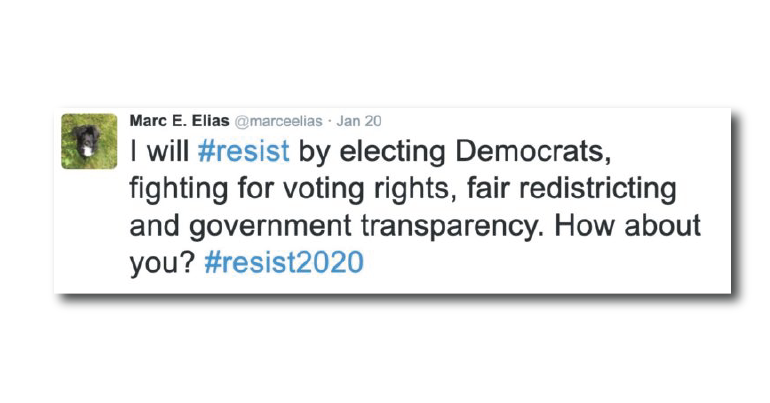Resistance is Not Enough

Like the human heart, a healthy democracy has its own steady rhythm.
Prospective candidates explore whether to run, money is raised and spent, primary elections are followed by general elections. Election Day comes, results are canvassed, certified and in some cases recounted. Finally, fancy certificates are issued to the winners with seals and ribbons.
Thump, thump.
Over the past four years, Donald Trump has fed our democracy a diet of garbage, lies and conspiracy theories, while starving it of needed nourishment of honesty and integrity. The result four years later? The careful rhythm of our democracy is out of sync. Our country is weakened.
In 2016 Trump won the election but lost the popular vote — and even then, he declared the election rife with election fraud. It was thus hardly surprising that he would not be gracious in defeat in 2020. But few expected the spectacle that we endured.
I knew that Trump would require his party to oppose the expansion of voting rights, but I did not envision its grossest applications — forcing people to wait in long lines in the midst of a pandemic, crippling the census and politicizing the U.S. Postal Service to delay the delivery of mail-in ballots.
And while I did not expect Trump to act responsibly in accepting defeat, I also did not anticipate that 17 state attorneys general and 128 members of Congress would ask the U.S. Supreme Court to throw out the lawful votes of millions of Americans across four states.
Like many people, I entered the Trump era thinking that all I needed to do was to resist — make it harder for Trump to damage democracy — and democracy would be okay. At noon on Jan. 20, 2017, as Trump was being sworn in, I tweeted:

It is hard to look back and realize that even after working for Hillary Clinton in the 2016 election, I was naively optimistic. After all, just two days later, I told the world that I had already read several books about totalitarianism in America and was about to read a multivolume account of life as a political prisoner in the Soviet Union’s Gulag.

Many of us were convinced that if we just prevented bad things from happening for four years, we would enter a new America on Jan. 20, 2021 at 12:01 p.m. We thought our democracy was resilient and might even get stronger from the stress placed on it.
Aaron Sorkin emailed his daughters the day after the 2016 election: “America didn’t stop being America last night and we didn’t stop being Americans and here’s the thing about Americans: Our darkest days have always—always—been followed by our finest hours.”
As we transition to an America without Trump as its president, the days are still dark — an epidemic is raging and the assault on democracy continues. Although the man will leave the White House, it has become clear that Trumpism will remain, now deeply embedded in the Republican Party. The damage that it has done and, until rooted out, will continue to do to our nation and its institutions and values is structural and will not be easily repaired.
Resistance to Trump was not futile, but it was not enough.
Even after the Jan. 6 armed insurrection at our national Capitol, many of our elected leaders still refuse to acknowledge that Joe Biden won a free and fair election on Nov. 3. Even before Biden is sworn in, Republican legislators throughout the country are using Trump’s false claims of fraud as an excuse to seek restrictions on the right to vote.
Rather than taking a step back and realizing that we came perilously close to democracy’s death, they’re rushing full steam ahead to make voting even harder for Black, brown and young voters.
When the history of this era is written, it will be remembered as shameful for many reasons, but none will stand out as starkly as the Republican Party’s complete abandonment of voting rights and commitment to free and fair elections as the guiding principle for how we select our leaders.
In Georgia, for example, where some of Trump’s most wild accusations of fraud were advanced and rejected, Republican legislators are reportedly preparing to enact draconian voting restrictions for the next election.
The list of proposals includes eliminating no excuse absentee voting, requiring photo identifications for anyone voting by mail and outlawing drop boxes as a means of returning mail-in ballots. Even these restrictions may not be enough to satisfy Georgia Republicans, who are reportedly also considering a requirement that absentee ballots be notarized and a prohibition on giving people waiting in line to vote water or a place to sit.
We can no longer seek to merely resist or even to restore. Our mission for the next four years must be to strengthen our democratic institutions and voting laws.
We will not achieve a healthy democracy by simply blocking bad things from happening or trying to restore institutions to what they were four years ago. We must build them anew with clear-eyed recognition that it will not be easy and that the Republican Party — still under the spell of Trump — will oppose our efforts.
In short, we need a new Democracy Agenda — one that addresses the realities in which we now live.
Here are five needed reforms to start:
1. Reforming the Election Certification Process
We must focus on shoring up the weak points in our system that Trump and his allies exploited. This includes replacing the current system of multiple canvasses and certifications that allowed democracy to be held hostage to quaint formalities. Certifications should be simple and fast and not solely reliant on election officials doing the right thing. Reform efforts must also include changes to post-election recount and contest provisions to disincentivize frivolous attacks, while allowing those with genuine issues to raise them and have them resolved.
2. Making Voting Rules Voter-Centric
We must focus on making voting systems more voter-centric. The test for voting laws, rules and practices should be whether they improve voting access and participation, not whether they make it easier or more efficient for election administrators. Laws that make voting harder need to be viewed with suspicion and subject to the most probing scrutiny. That means not allowing claims of unspecified “fraud” to be used as an excuse to disenfranchise voters. We don’t balance any other constitutional right with government convenience or generalized and unsubstantiated fears of harm, and we should not do so with voting.
3. Maximizing Ballot Acceptances
Too many states have arcane, unnecessary requirements for ballots to be counted. Pennsylvania’s law that rejects so-called “naked ballots” is silly and serves no purpose. Same with laws that reject ballots when a voter fails to handwrite the date on their ballot envelopes, omits their zip code or transposes some numbers. Rejecting ballots that are cast by lawful voters in the wrong precinct is similarly indefensible. Absent proof of actual fraud, we must insist that all eligible voters have their ballots counted.
4. Auditing Election Administration
We need to audit and publicize how our elections were administered. Counties should be required to publish the average and longest wait times at every polling location they operated. They should be subject to an independent review of each and every ballot they rejected and have to report any ballots rejected in error. This data will both improve election administration in the future and provide valuable insight into which election administrators are disenfranchising voters. We also need to be insistent that persistent under-resourcing and long lines at voting places, a phenomenon most often observed in heavily minority areas, are addressed and rectified.
5. Publishing Election Changes
Every jurisdiction in America should be required to publish online any change to an election law, rule, policy or practice that may negatively impact voters 30 days before it can take effect. While other Voting Rights Act-specific reforms are needed, there is no reason any voter should wake up anywhere and face a new barrier to voting that they did not know would take effect.
These reforms will not solve every problem with our democracy, nor will they protect every voter. But they will help strengthen the heartbeat of our democracy and reset its steady rhythm.
Thump, thump.